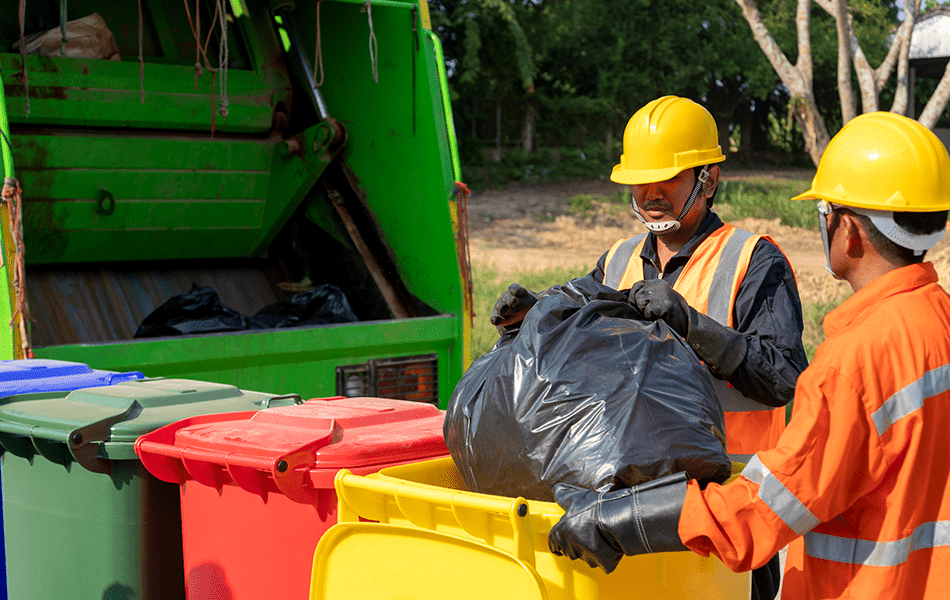In residential communities, waste management refers to the process of collecting, disposing, and effectively managing the waste generated by households within a specific community or residential area. It involves implementing strategies and practices to minimize the negative environmental and health impacts of waste, while promoting resource conservation and sustainability.
The current waste data in the world indicates a significant global waste challenge. According to recent estimate by the World Bank, the world generates over 2 billion metric tons of municipal solid waste annually, and this number is expected to increase to 3.4 billion tons by 2050. The Philippines, like many other countries, also faces waste management issues. In 2020, the country generated approximately 40,000 metric tons of waste per day, with around 9,000 tons produced in the National Capital Region alone.
At present, the Philippines facing unique challenges in waste management due to its growing population, urbanization, limited land resources, and environmental concerns. On the other hand, continuous efforts are being made to strengthen waste management systems, improve infrastructure, and enhance community participation to achieve more sustainable residential waste management in the country.
Waste Management in the Philippines
In the Philippines, residential waste management practices have evolved over the years to address the country’s waste management challenges. Although, the effectiveness of these practices still currently varies across different regions and communities in the country.
Here are some of the current residential waste management practices being implemented in the Philippines:
Waste Segregation at Source and Composting
The Philippines promotes waste segregation at the household level, requiring residents to separate their household waste into categories such as biodegradable, recyclable, residual, and special waste. LGUs provide guidelines and conduct education campaigns to encourage proper waste segregation.
Composting is encouraged as a sustainable solution for managing organic waste. Backyard composting and community composting initiatives are promoted to both reduce waste and divert biodegradable waste from landfills. LGUs provide guidance on composting techniques and distribute composting bins to interested households.
Barangay-Based and LGU Waste Management
Barangays play a vital role in waste management. They establish Barangay Solid Waste Management Committees (BSWMCs) responsible for implementing waste management programs within their communities. These committees coordinate waste collection, promote waste segregation, and oversee the operation of Materials Recovery Facilities (MRFs).
Local government units are responsible for waste collection and disposal in residential areas. They coordinate the collection of segregated waste and ensure its proper disposal in sanitary landfills or waste-to-energy facilities, where applicable. LGUs conduct public awareness campaigns, seminars, and workshops to educate residents about waste segregation, proper waste disposal practices, and the importance of recycling. These efforts aim to change behavior and promote active participation in waste management.
Materials Recovery Facilities or MRFs are established in residential communities and serve as centers for temporary storage, sorting, and processing of recyclable materials. They play a crucial role in facilitating recycling efforts, generating income from recyclables, using recycling resources and reducing waste sent to landfills.
Ecological Solid Waste Management Act (RA 9003)
The Ecological Solid Waste Management Act serves as the legal framework for waste management in the Philippines. It emphasizes waste segregation at source, recycling, composting, proper disposal, assigning responsibilities to local government units (LGUs), establishing materials recovery facilities (MRFs) for sorting recyclables, prohibiting open dumping and burning, implementing extended producer responsibility (EPR), emphasizing public participation and education, and enforcing penalties for non-compliance. LGUs are responsible for implementing waste management programs in their respective areas. This legislation aims to address waste management challenges by promoting sustainable practices, recycling, and proper disposal, while involving the community, manufacturers, and LGUs in achieving effective waste management and environmental protection.
See related article at Bria Homes: A Comprehensive Guide to Sustainable Water Management in Philippine Homes
Waste management around the world
Effective residential waste management practices vary worldwide, depending on the local context, infrastructure, and regulations of each country. Here are some examples of effective residential waste management practices implemented globally:
- Source Segregation and RecyclingMany countries promote source segregation of waste at the household level, where residents separate their waste into different categories such as recyclables, organic waste, and non-recyclables. This facilitates recycling and proper disposal. Countries like Germany, Sweden, and Japan have achieved high recycling rates through effective source segregation and recycling programs.
- Pay-As-You-Throw (PAYT) ProgramsPAYT programs charge residents based on the amount of household waste they generate. This encourages waste reduction and recycling, as residents have a financial incentive to produce less waste. Countries like the Netherlands and Belgium have successfully implemented PAYT programs, resulting in reduced waste generation and increased recycling rates.
- Composting and Organic Waste ManagementPromoting composting of organic waste is an effective strategy to divert biodegradable waste from landfills. Countries like Denmark and Canada have implemented community composting programs, providing residents with composting bins and educating them on composting techniques.
- Waste-to-Energy (WTE) FacilitiesWaste-to-Energy facilities convert non-recyclable waste into energy through processes like incineration or anaerobic digestion. Countries like Sweden and Denmark heavily rely on WTE facilities to generate electricity and heat, reducing the volume of waste going to landfills and utilizing waste as a resource.
- Extended Producer Responsibility (EPR)EPR policies shift the responsibility of managing waste from products to the producers. Producers are required to take back and properly dispose of their products, including packaging waste. EPR programs have been successful in countries like Germany and Canada, where manufacturers and retailers are responsible for recycling and managing the waste generated by their products.
- Community-Based InitiativesCommunity-based waste management initiatives promote active involvement and ownership among residents. These initiatives include community recycling centers, neighborhood composting projects, and repair and reuse programs. Examples can be found in countries like the United States, Australia, and Brazil.
It is important to note that the effectiveness of these practices depends on factors such as infrastructure, local regulations, and community participation. The combination of multiple strategies tailored to the specific needs and challenges of each region is key to achieving successful residential waste management worldwide.

What can I do to help? 10 easy tips to manage waste at home and community
At present, waste management is a pressing issue that requires the collective effort of individuals, households, and communities. While it may seem overwhelming, there are numerous simple yet impactful steps we can take to contribute to waste reduction and promote sustainability. By implementing these ten easy tips, you can make a positive difference in managing your waste stream both at home and in your community. Let’s explore these practical actions that can be incorporated into our daily routine to help with the waste problem.
- Practice Waste SegregationImplement a waste segregation system at home and encourage your community to do the same. Separate your household waste into different categories such as recyclables (plastic, paper, glass, metal), organic (food scraps, garden waste), and non-recyclables (plastic wrappers, styrofoam). This makes recycling and proper disposal more manageable.
- Reduce Food WastePlan meals, make shopping lists, and avoid overbuying groceries to minimize food waste. Store food properly to maintain its freshness. Utilize leftovers creatively or compost them instead of throwing them away.Read more at Bria Homes: 7 things you can recycle to reduce waste at home
- Good old CompostingStart a composting system for your organic waste. Composting turns food scraps and garden waste into nutrient-rich compost that can be used for gardening or landscaping. Encourage your community to set up composting bins or establish a community composting program.
- Reduce Single-Use ProductsLimit the use of single-use items such as plastic cutlery, straws, and disposable plates. Opt for eco-friendly alternatives, such as bamboo or stainless steel utensils, reusable straws, and biodegradable plates.
- Go for Reusable ItemsEmbrace reusable alternatives to single-use items and avoid single-use products as much as you can. Use reusable shopping bags, water bottles, coffee cups, packaging materials, and food containers instead of disposable ones. Choose reusable alternatives made from eco-friendly. This reduces waste and promotes sustainability. You can also encourage your community to support local businesses that promote sustainable practices.
- Recycle, recycle, and recycleFamiliarize yourself with local recycling guidelines and ensure you are recycling properly. Use recycled materials to promote these kind of products. Rinse out containers, remove caps or lids, re-use packaging materials, and flatten boxes to save space. Donate or recycle electronics and hazardous waste responsibly. You can suggest having designated recycling stations in your neighborhood or participate in recycling programs.
- Repair and DonateRepair broken items instead of discarding them immediately. Many household items can be fixed with a little effort. You may consider donating unwanted but usable items to local charities or thrift stores. If you want to go big, you can organize community swap events where people can exchange items they no longer need.Read more at Bria Homes: What is the best way to properly dispose of electronic waste at home?
- Educate and Involve the FamilyYou can start at your home and neighborhood, raise awareness among family members and your community about the importance of waste management. Help educate on waste reduction, recycling, and composting. Encourage everyone to actively participate in waste management efforts and of course, set a positive example for others.
- Reduce Paper WasteOpt for digital alternatives whenever possible to reduce paper waste. Pay bills online, choose e-tickets, and choose digital subscriptions or receipts. Another basic and easy thing you can also do is to use both sides of paper before recycling it.
- Engage in Community Clean-up InitiativesParticipate and take part in community clean-up activities. You can plan for a small community service and organize your neighborhood’s team-building activity that would focus on cleaning up public spaces, parks, or beaches around your area. This fosters a sense of community pride and raises awareness about the importance of keeping the environment clean.
Additionally, it is key to advocate for better waste management infrastructure and policies in your community. You can engage with local authorities, NGOs, and community organizations to support initiatives for waste separation such as waste reduction campaigns, waste collection drives, and the establishment of recycling centers. And more importantly, regularly practice the proper disposal of waste at home and community as earlier mentioned.
By working together, we can make a significant impact on environmental health and waste management, creating a cleaner and more sustainable environment for our home and community.





